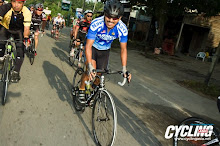Drinking enough fluid before, during and after both training and racing is essential. As little as 1.7% dehydration may impair energy levels, concentration and performance.
Dehydration can lead to:
- Impaired concentration and co-ordination
- Increased perception of effort
- Increased body temperature and heart rate
- Impaired performance
- Nausea, vomiting and other stomach upsets
- Severe dehydration may result in collapse, heat stress and hospitalisation.
General Hydration Guidelines
Priority 1 Adequate fluid volume
- Start drinking first thing in the morning and consistently throughout they day.
- Always carry drink bottle, off and on the bike.
- Individual fluid requirements will vary, based on estimated losses.
- Urine colour is an excellent indicator of hydration levels. Urine that is clear or very pale yellow indicates a good level of hydration (note that vitamin/mineral supplements often cause urine to be bright yellow in colour).
Priority 2 Adequate carbohydrate and electrolytes
- Water should generally be the main fluid consumed throughout the day.
- Other fluids also contribute to daily intake eg. sports drink, milk, juice, cordial.
- Sports drinks are particularly important for prolonged exercise (> 1 hour) and for exercise in the heat where fluid losses are high. Sports drinks are formulated to maximise fluid absorption and provide a source of carbohydrate and electrolytes.
- Sports drink is important before, during and after training/races to provide fuel and electrolytes.
- Athletes identified as salty sweaters will also require higher intake of fluids containing sodium.
- Milk and milk-based drinks can be an excellent recovery fluid, providing carbohydrate, sodium and protein.
Priority 3 Appropriate timing of intake
- Fluid intake spaced throughout the day
- Increased intake during and after training/competition
Tips for Staying Hydrated
Pre-Training/Competition
- If you turn up dehydrated on the start line then you are giving the rest of the field a head start from the beginning. Drink plenty of fluid the night before, and in the hours leading up to a training session or competition.
- Have a drink with all meals and snacks and keep a bottle with you for all the times in between. HOWEVER, be careful not to over consume excessive amounts of plain water, as there is a small risk of over-hydrating.
- Drink 400-600ml 10-20 mins before your event.
During Training/Competition
- Begin drinking early and continue to drink small amounts regularly.
- Develop a plan for drinking based on your estimated individual sweat losses (determined by measuring fluid losses and intake during exercise). In general, aim to consume 80% of estimated losses during exercise.
- It is better to adopt a pattern of drinking small volumes regularly, rather than trying to tolerate large volumes at once. A rough guide is to aim for 600-1000ml of water or sports drink per hour of exercise, although the volume will vary between individuals and climates.
- For road races where there are significant hill sections, many cyclists try to reduce any extra weight on the bike and this often results in a choice to carry less fluid. In these situations, a specific hydration plan should be developed to ensure the balance is achieved between optimal weight and adequate hydration for performance.
After Training/Competition
- It is essential to replace the fluid that you have lost. Aim to drink 150% of the measured fluid loss in the next few hours following exercise to account for ongoing sweat and urine losses. For example, if you lost 1000mL, you will need to drink 1500mL to fully re-hydrate.
- When fluid losses are high and/or rapid re-hydration is needed, sodium replacement may be required. Sodium helps you to re-hydrate by promoting fluid absorption and aiding in fluid retention. Sports drinks and oral re-hydration solutions (eg. Gastrolyte) can help to replace sodium after exercise.
- It can be useful to try some salty carbohydrate snacks for glycogen recovery rather than all sweet options. For example: vegemite sandwiches/rolls, soups, noodle stir-fries with soy sauce, rice crackers or pretzels. Don't over-do it though, speak to a VIS Sports Dietitian to determine optimal sodium intake for you.
* Every athlete is different - understand your individual fluid and nutrition needs and the steps required to achieve optimal hydration and performance. A Sports Dietitian can help you work out the best nutrition and hydration strategies for your specific individual needs.

